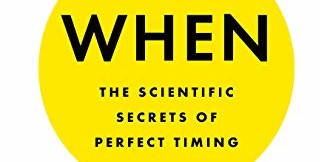When: The Scientific Secrets of Perfect Timing

Daniel Pink is one of my favorite behavioral scientists. I just finished When: The Scientific Secrets of Perfect Timing. In it, he shares:
- We all have different times when we are most effective. This is our chronotype.
- Most have a chronotype that peaks in the morning, have an afternoon trough, and an evening bounce.
- Beyond the above chronotype, there are two others: night owl and lark. Night owls hit their stride in the evening and are typically more creative and impulsive. Larks believe in Ben Franklin’s early to bed, early to rise with their best hours in the early AM. Larks tend to be stable and introverted.
- So, how should one schedule the day? Base it on your chronotype and plan accordingly. For example, if you’re not a lark or an owl (which is 60-80% of the population), the morning peak is the best time to tackle focused tasks. Do idea generation in the early evening.
- If you’re an owl, flip the above. Spend night time thinking critically and save the morning for creative tasks.
- For meetings or negotiations, mornings are typically better than other parts of the day.
- Are you having a medical procedure? Do it in the morning. Mistakes are most common after 3:00 PM. At 9:00 AM, there’s a 1% chance of an error. By 4:00, that quadruples.
- Breaks are good. Every hour, taking a five-minute break reduces fatigue and improves motivation.
- Here’s the recipe for a nap which seems counter-intuitive. Have a cup of coffee, then set a timer for 20 minutes. If you’re like most, you’ll fall asleep in about seven minutes, get a dozen or so minutes of sleep, and have the ideal nap.
- With projects, use a premortem. Try to identify all the ways things could go wrong and identify ways to avoid them. Understand the power of the midpoint. Use the middle of a project, like a sports team down by one point after the first half, as an inspiration to bring the effort needed to get the project to completion.
- While less a business idea than an interesting observation, in When the author shares the concept of “9-enders.” Whether it’s running a marathon or committing suicide, there’s a disproportionate number of 29, 39, 49, etc., who are inclined to do dramatic actions when finishing a decade.
- While some life planners say happiness comes from being present, absolute satisfaction is when your current self lines up with your future and past you.